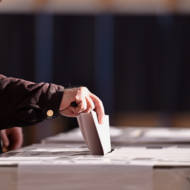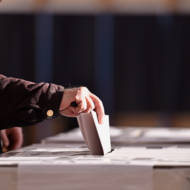
Denouncing Israel can be a full-time job, one that leaves little room for remembering that, for 14 years, Palestinians have been deprived of their right to touch a ballot.
By Khaled Abu Toameh, The Gatestone Institute
On March 2, Israeli voters headed to the ballot boxes for the 10th time since the signing of the Oslo Accords with the Palestinians in 1993. The Palestinians, by contrast, have since had only four elections — two for the Palestinian Authority (PA) presidency and two for the Palestinian parliament, the Palestinian Legislative Council (PLC).
The last Palestinian election took place in 2006, when Palestinians voted for the PLC. Hamas, the Islamist movement ruling the Gaza Strip, won 44.4% of the vote (74 seats), while PA President Mahmoud Abbas’s rival Fatah faction won 41.4% of the vote (45 seats). The PLC has 132 seats.
One year after the PLC election, Hamas violently seized control of the Gaza Strip after overthrowing Abbas’s PA regime. The Hamas coup led to a split between the West Bank (Judea and Samaria) and Gaza Strip and has effectively paralyzed the Palestinian parliament ever since.
The Palestinians are the only people in the Middle East who do not have a functioning parliament. In 2018, Abbas decided to dissolve the PLC and said he would hold elections within six months. Abbas’s move drew sharp criticism from many Palestinians, who accused him of seeking to tighten his grip on the PA and its institutions.
The 84-year-old Abbas has not fulfilled his promise to hold a parliamentary election “within six months.” Who needs a parliament when you have a president who recently entered the 16th year of his four-year-term in office? Who needs pesky parliament members who may pester their president and government by asking uncomfortable questions or — even worse — criticizing the performance of the Palestinian leadership?
The absence of parliamentary life for the Palestinians has, in fact, been highly convenient for Abbas, who continues to demonstrate zero tolerance towards his political rivals and critics.
Just this week, Abbas ordered his security forces in the West Bank to arrest another Palestinian journalist, Ayman Kawarik, for posting critical comments on Facebook. Kawarik is far from the first Palestinian journalist to land in Abbas’s prisons for expressing his views. No one ever speaks critically of the Palestinian leadership.
This crackdown on critics, then, is how Abbas accommodates less-than-flattering comments from Palestinian journalists. His capacity to tolerate criticism from members of the (long-defunct) parliament is equally absent.
Even though the Palestinian parliament has not been functioning since 2007, Abbas has responded to opinions from particular parliament members by stripping them of their immunity or cutting their salaries.
In 2016, Abbas stripped five members of parliament of their parliamentary immunity: Jamal Tirawi, Shami al-Shami, Najat Abu Bakr, Nasser Juma’ah and Mohammed Dahlan. A year later Abbas also decided to stop paying salaries to several members of parliament, including some belonging to his own Fatah faction.
While Palestinian members of parliament have been deprived of salaries and stripped of parliamentary immunity, as well as denied freedom of expression and the opportunity to exercise their parliamentary work, Arab members of the Knesset in Israel are free to say whatever they wish about the Israeli government and its policies without giving a single thought to possible repercussions.
Arab Knesset member Ahmed Tibi, for example, has been a vehement and vocal critic of Israeli Prime Minister Benjamin Netanyahu and his government’s policies. Because Tibi and his Arab colleagues in the Knesset live in Israel, they can run in parliamentary elections and voice their views without any fear of retribution. If the Arab Knesset members were living under the Abbas regime, the likely scenarios would be arrest or worse.
Envying Arab Knesset Members
The Palestinian members of parliament can only envy their Arab colleagues in Israel for the basic existence of free elections – and for the exceptional freedom that Arab citizens of Israel enjoy. Under PA rule, Tibi and his colleagues would not have lasted very long.
In September 2019, Abbas — this time during a speech before the United Nations General Assembly — once again vowed to hold long-overdue general elections in the West Bank.
So far, however, no elections have taken place. Predictably, Abbas is laying the blame for his own playful behavior at Israel’s feet: there can be no elections unless Israel allows the vote to take place in Jerusalem. Although Israel has not said it would ban Arabs in Jerusalem from participating in the Palestinian election, Abbas — together with the European Union — has been trying to make it look as if Israel is deliberately obstructing the planned vote. He has also previously accused Hamas of the same thing: obstructing the election.
Abbas, it would seem, does not want new elections, not for the presidency and not for the parliament. He would doubtless prefer to continue running the PA as his private fiefdom. Why should Abbas, who was elected in January 2005, bother himself with a new presidential election that would require him to devote time and energy to campaigning? Abbas, moreover, does not seem about to give any Palestinian the pleasure of challenging him in some election. As far as he is concerned, has he not won the right to be president for life?
Notably, Abbas is not about to repeat his mistake of 2006, when Hamas won the parliamentary election. A Hamas-dominated parliament would only be a torment for his aides and him.
As Israeli voters headed to the ballot boxes, Abbas continued to talk about his desire to give his people the opportunity to elect their parliament members and president. Try to find even one Palestinian who believes him.
For now, Palestinians in the West Bank and Gaza Strip will have to continue accepting the reality of living under the unelected and totalitarian leaders of the PA and Hamas. For the Palestinians, each Israeli election serves as a sad reminder of the catastrophic failure of Palestinian leaders and the complete absence of democracy under the PA and Hamas.
The international community, meanwhile, continues to ignore that the Palestinians are being denied the chance to hold elections. Denouncing Israel can be a full-time job, one that leaves little room for remembering that, for 14 years, Palestinians have been deprived of their right to touch a ballot.
Khaled Abu Toameh, an award-winning journalist based in Jerusalem, is a Shillman Journalism Fellow at Gatestone Institute.
Do You Love Israel? Make a Donation to Show Your Support!
Donate to vital charities that protect Israelis and help inspire millions around the world to support Israel too!
Now more than ever, Israel needs your help to fight – and win – the battle of public opinion.
Anti-Israel bias and boycotts are out of control. Israel’s enemies effectively use social media to incite brutal terror against innocent Israeli civilians. Please help us fight back!
Source: United with Israel
